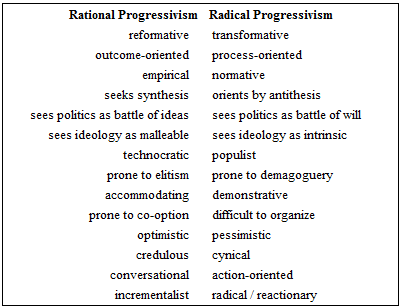The definitions of the terms liberal and conservative have been the subjects of much debate in contemporary American politics. But it has become increasingly clear that the term "progressive" is equally ambiguous, and is associated with at least two relatively distinct philosophical traditions. Although these two "progressivisms" share common ground on many (probably most) issues, they are at loggerheads on some others, as has perhaps become more apparent since the election of President Obama.

The first type of progressivism has its philosophical underpinnings in 18th Century, Enlightement-era thought. It believes that politics is a battle of ideas. It further believes that through the use of reason and the exchange of ideas, human society will tend to improve itself through scientific and technological innovation. Hence, it believes in progress, and for this reason lays claim to the term progressive. Because of its belief and optimism in the faculties of human reason, I refer to this philosophy as rational progressivism.
Rational progressivism tends to be trusting, within reason, of status quo political and economic institutions -- generally including the institution of capitalism. It tends to trust these institutions because it believes they are a manifestation of progress made by previous generations. However, unlike conservatism, it also sees these institutions as continuing works in progress, subject to inefficiencies because of distorted or poorly-designed incentives, poorly-informed or misinformed participants, and competition from 'irrational' worldviews like religion. It also recognizes that certain persons who stand to benefit from preserving the status quo, particularly elected officials but also corporations, may seek to block this progress to protect their own interests. The project of rational progressivism, then, is to propagate good ideas and to convert them, through a wide and aggressive array of democratic means, into public policy.
The second type of progressivism is what I call radical progressivism. It represents, indeed, a much more radical and comprehensive critique of the status quo, which it tends to see as intrinsically corrupt. ...........snip
Snip....
Interesting read.
http://www.fivethirtyeight.com/2009/02/two-progressivisms.html